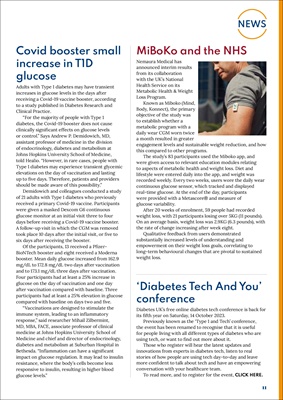
11
NEWS
Covid booster small
increase in T1D
glucose
Adults with Type 1 diabetes may have transient
increases in glucose levels in the days after
receiving a Covid-19 vaccine booster, according
to a study published in Diabetes Research and
Clinical Practice.
"For the majority of people with Type 1
diabetes, the Covid-19 booster does not cause
clinically significant effects on glucose levels
or control." Says Andrew P. Demidowich, MD,
assistant professor of medicine in the division
of endocrinology, diabetes and metabolism at
Johns Hopkins University School of Medicine,
told Healio. "However, in rare cases, people with
Type 1 diabetes may experience transient glycemic
elevations on the day of vaccination and lasting
up to five days. Therefore, patients and providers
should be made aware of this possibility."
Demidowich and colleagues conducted a study
of 21 adults with Type 1 diabetes who previously
received a primary Covid-19 vaccine. Participants
were given a masked Dexcom G6 continuous
glucose monitor at an initial visit three to four
days before receiving a Covid-19 vaccine booster.
A follow-up visit in which the CGM was removed
took place 10 days after the initial visit, or five to
six days after receiving the booster.
Of the participants, 13 received a PfizerBioNTech
booster and eight received a Moderna
booster. Mean daily glucose increased from 162.9
mg/dL to 172.8 mg/dL two days after vaccination
and to 173.1 mg/dL three days after vaccination.
Four participants had at least a 25% increase in
glucose on the day of vaccination and one day
after vaccination compared with baseline. Three
participants had at least a 25% elevation in glucose
compared with baseline on days two and five.
"Vaccinations are designed to stimulate the
immune system, leading to an inflammatory
response," said researcher Mihail Zilbermint,
MD, MBA, FACE, associate professor of clinical
medicine at Johns Hopkins University School of
Medicine and chief and director of endocrinology,
diabetes and metabolism at Suburban Hospital in
Bethesda. "Inflammation can have a significant
impact on glucose regulation. It may lead to insulin
resistance, where the body's cells become less
responsive to insulin, resulting in higher blood
glucose levels."
'Diabetes Tech And You'
conference
Diabetes UK's free online diabetes tech conference is back for
its fifth year on Saturday, 14 October 2023.
Previously known as the 'Type 1 and Tech' conference,
the event has been renamed to recognise that it is useful
for people living with all different types of diabetes who are
using tech, or want to find out more about it.
Those who register will hear the latest updates and
innovations from experts in diabetes tech, listen to real
stories of how people are using tech day-to-day and leave
more confident to talk about tech and have an empowering
conversation with your healthcare team.
To read more, and to register for the event, CLICK HERE.
MiBoKo and the NHS
Nemaura Medical has
announced interim results
from its collaboration
with the UK's National
Health Service on its
Metabolic Health & Weight
Loss Program.
Known as Miboko (Mind,
Body, Konnect), the primary
objective of the study was
to establish whether a
metabolic program with a
daily wear CGM worn twice
a month resulted in greater
engagement levels and sustainable weight reduction, and how
this compared to other programs.
The study's 83 participants used the Miboko app, and
were given access to relevant education modules relating
to aspects of metabolic health and weight loss. Diet and
lifestyle were entered daily into the app, and weight was
recorded weekly. Every two weeks, users wore the daily wear
continuous glucose sensor, which tracked and displayed
real-time glucose. At the end of the day, participants
were provided with a Metascore® and measure of
glucose variability.
After 20 weeks of enrolment, 59 people had recorded
weight loss, with 21 participants losing over 5KG (11 pounds).
On an average basis, weight loss was 2.9KG (6.3 pounds), with
the rate of change increasing after week eight.
Qualitative feedback from users demonstrated
substantially increased levels of understanding and
empowerment on their weight loss goals, correlating to
long-term behavioural changes that are pivotal to sustained
weight loss.